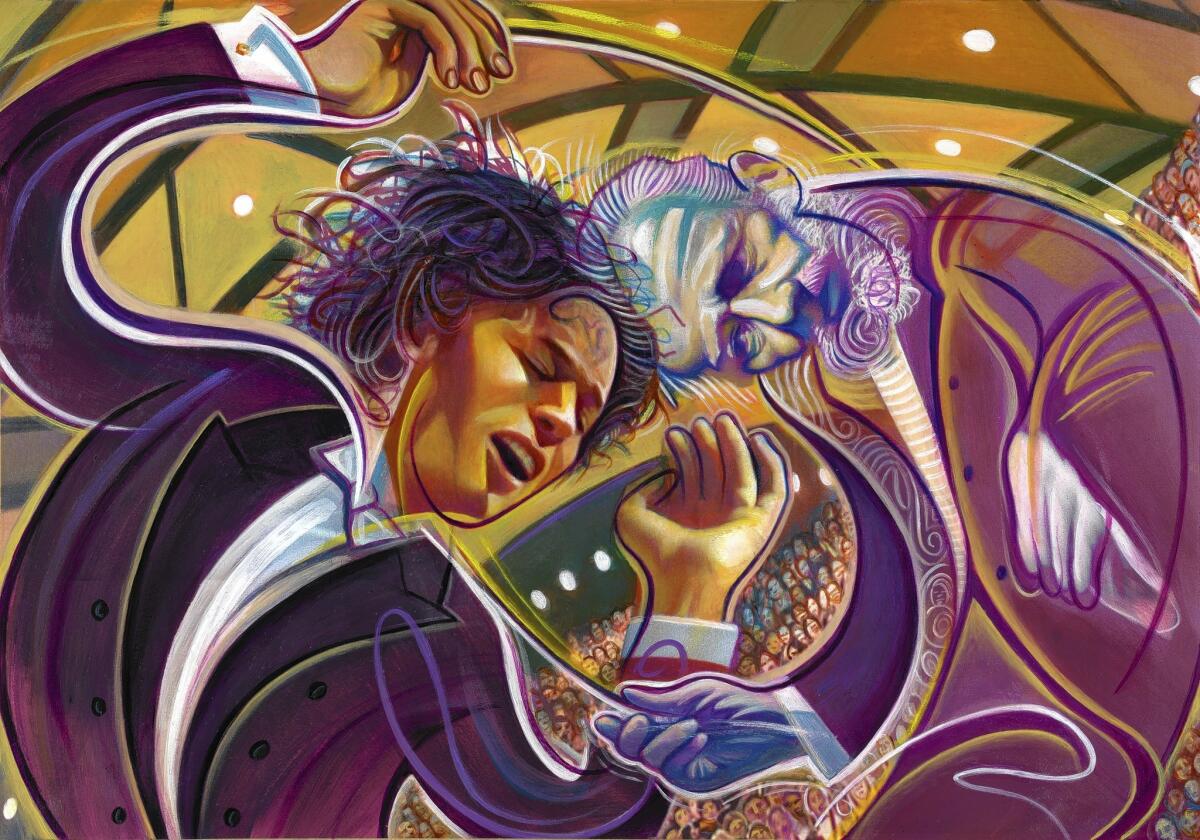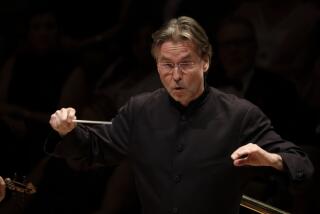Gustavo Dudamel gets to the heart of Tchaikovsky’s appeal

We cannot escape Pyotr Ilyich Tchaikovsky.
On Thursday, Gustavo Dudamel and the Los Angeles Philharmonic, with help from the Símon Bolívar Symphony Orchestra of Venezuela, begin an 11-day TchaikovskyFest at Walt Disney Concert Hall that will include the Russian composer’s six symphonies along with other orchestral and chamber works.
But unlike other festivals — and especially the Mahler Project, Dudamel’s concentrated traversal through nine symphonies with the L.A. Phil and his Bolívars two years ago — the TchaikovskyFest has no musical frame. Mahler symphonies, though not uncommon, are massive, and each is an event, while Russia’s most popular composer is part of daily life for much of the world.
GRAPHIC: Highest-earning conductors
It is no oddity that Wednesday the touring Bahia Orchestra Project, composed of young Brazilian players, has Tchaikovsky on its bill at the Valley Performing Arts Center or that the Haifa Symphony Orchestra from Israel comes to the same venue the week after TchaikovskyFest with a Tchaikovsky symphony and concerto.
No, there is no avoiding Tchaikovsky. The Winter Olympics may be Putin’s games, but the Russian president was clearly not about to let passage of anti-gay legislation prevent making a famously gay composer, with a unique ability to directly convey Russia’s restive soul, a pressing symbol of the opening ceremonies at Sochi.
And then there was this school boy 25 years ago in backwater Barquisimeto, one of Venezuela’s hundreds of thousands of Tchaikovsky-besotted young musicians. “It is all coming from Maestro Abreu,” Dudamel says, sitting in his Disney Hall office. “Tchaikovsky is Abreu’s composer.”
José Antonio Abreu’s Venezuela-wide El Sistema music education program has been internationally hailed for changing lives. Sistema youngsters, most from disadvantaged backgrounds, enter youth orchestras as early as kindergarten, typically starting with simplified versions of such Tchaikovsky favorites as “Marche Slave” and the “1812 Overture.”
It is not uncommon throughout the country to find student ensembles of 800 or even more 11-year-olds playing these pieces from memory over and over with such raucously infectious enthusiasm that Tchaikovsky can seem like a Venezuelan national sport. Thanks to Abreu, Tchaikovsky can be an irrepressible source of motivation for kids not to turn to gangs. (The other classical pillars of the program are Mozart, Verdi and Vivaldi.)
CRITICS’ PICKS: What to watch, where to go, what to eat
With Abreu turning 75 this year, Dudamel says he thinks a Tchaikovsky festival a particularly apt way to pay tribute to his mentor, who will be present. “He’s coming, of course,” Dudamel says with a laugh. “A Tchaikovsky festival? He would come even if we were playing on Jupiter.”
But why Tchaikovsky? “Tchaikovsky’s music has a beauty and a simplicity,” Dudamel says, “while at the same time requiring a virtuoso technique. That is good for a student. You have to learn something that is difficult but that is also beautiful and that you can easily connect with.
“That doesn’t mean that it’s not a serious music,” he continues, knowing right away what is coming next. Tchaikovsky needs, and he has always needed, to be defended. His popularity, the accessibility of his music and his, well, simplicity, have been ever suspect in progressive, academic and critical circles.
About the best Tchaikovsky could get from George Bernard Shaw, in his early days as a music critic, was to be called “confessedly the orchestral voluptuary.” Pierre Boulez once dismissively wrote that every “Tchaikovsky-lover at a Tchaikovsky concert is celebrating the cult of himself.”
Dudamel puts this in perspective. “For me,” he says, “Tchaikovsky is one of the most amazing composers. If you see the score, it is really simple. You immediately recognize that phrasing and structure are simple, nothing crazy. But sometimes simplicity is, I feel, beautiful.
“The power in Tchaikovsky is in the melody. Melodies can be very melancholic, and I feel connected with that and the nostalgia. When you listen to, I don’t know, take the main theme of ‘Swan Lake’ or the beginning of the second movement of the Fourth Symphony, it sounds like easy ballet music — four bars, four bars, four bars, four bars.
PHOTOS: Arts and culture in pictures by The Times
“But in the main section of the first movement of the Fourth Symphony, Tchaikovsky writes that it should be like a waltz. It’s a waltz but not a waltz, a slow waltz but with the accent not on the first beat.” Dudamel sings the phrase, letting that first beat fall longingly onto the second as if dejectedly pulling a reluctant partner onto the dance floor.
The idiosyncrasies of this phrase have long been taken for granted and can be a temptation for a conductor to celebrate the cult of him or herself, ostentatiously signaling emotion through holding back a little here and pushing ahead there, something Dudamel maintains that he remains on guard against.
“I know these symphonies like I know my hands,” Dudamel says. When he became music director of the Caracas Youth Orchestra, he conducted Tchaikovsky’s Second Symphony on his first program. He was 17. Dudamel made his U.S. debut at the Hollywood Bowl conducting the L.A. Phil in Tchaikovsky’s Fifth Symphony in 2005 and created a sensation. He was 24. Dudamel turned the Sixth (“Pathetique”) into a hallmark of his first season as L.A. Phil music director and took it on his first tour with the orchestra.
But Dudamel finds that familiarity can create its own problems for him and for the orchestra. “One reason,” he says, “is that orchestras play some of these symphonies so often with so many different conductors. Tchaikovsky becomes routine, and you forget the deepness of this music. But it depends on how you approach the work.
“If you listen to Mravinsky” — the legendary Russian conductor Yevgeny Mravinsky — “Tchaikovsky became a huge composer. Huge. You find that you have an infinity of possibilities.”
FULL COVERAGE: Walt Disney Concert Hall turns 10
As a student, Dudamel says he would watch videos of Mravinsky rehearsing with the Leningrad Symphony, which knew this music by heart. “He was always stopping and stopping and stopping. When you see that as a young artist, you release just how difficult your responsibility is. Because if a master like Mravinsky is searching for those things after having played the music for 50 or 60 years, what can we do with it?”
Dudamel also says that, for all the Tchaikovsky he has conducted since his youth, he has lately been careful not to overdo it. He, in fact, has had little experience with the first three symphonies, which are not commonly done. He has never before conducted the First and hasn’t led the Second or Third since 2000. “Between 1999 and 2006, I conducted Tchaikovsky all the time, but not so much since.” His last Fifth was two years ago.
Ultimately, Dudamel feels that the best Tchaikovsky defense is to perform the composer with clarity, allowing Tchaikovsky’s personality to speak for itself through the music. He is, after all, a composer whose life has generated much interest. Academia is full of Tchaikovsky squabbles. One faction asserts that Tchaikovsky committed suicide in 1893 out of anguish over his homosexuality and of it being exposed.
But much modern scholarship claims that Tchaikovsky’s sexuality was widely known, that Russia was more tolerant then than it is now, and that the composer was the victim of a cholera outbreak. Tchaikovsky’s circle most likely covered up the cause of his death, because cholera, unlike homosexuality, was thought of as something affecting the lower classes.
Moreover, Tchaikovsky had his progressive defenders, particularly on the West Coast. Stravinsky adored Tchaikovsky and conducted the Second Symphony with the L.A. Phil in 1953, demonstrating the rhythmic interest in the score, not the heart-on-sleeve emotion. In the bedroom of Lou Harrison, the West Coast experimental romantic, hung a crude portrait of a nude Tchaikovsky.
Los Angeles’ large émigré community has included many notable Russian musicians, including the film composer Dimitri Tiomkin, who devoted part of his life to producing a Russian biopic, “Tchaikovsky,” in 1969, a year before Ken Russell’s “The Music Lovers” starring Richard Chamberlain as the composer.
“You cannot avoid Tchaikovsky’s personal history.” Dudamel acknowledges. But he says that if you look at the music, “Tchaikovsky seems a much less turbulent guy than someone like Mahler.
“He was a more normal composer than Mahler, an establishment composer,” in the sense of writing in established models. “But because of that his feeling could come directly from here” — Dudamel points to his heart, and then his head — “not here.”
That is something else from which there is, in Tchaikovsky, no escape. “In every note,” Dudamel concludes, “you feel something.”
This is the latest in a series of occasional articles in which Mark Swed discusses music with L.A. Philharmonic Music Director Gustavo Dudamel.
More to Read
The biggest entertainment stories
Get our big stories about Hollywood, film, television, music, arts, culture and more right in your inbox as soon as they publish.
You may occasionally receive promotional content from the Los Angeles Times.







